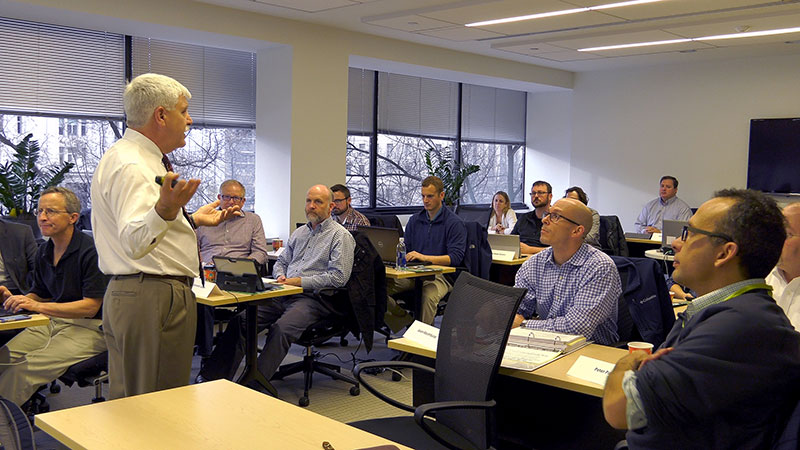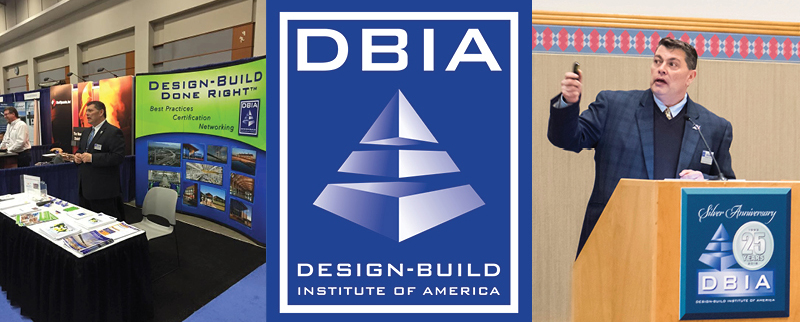Nonprofit Spotlight: Design-Build Institute of America
By Amy Nelson
In ancient times, master builders guided both the design and building of structures. Iconic edifices such as Imhotep’s Pyramid of Djoser and Brunelleschi’s Dome were created this way. So was the Parthenon. In fact, in the 1750s BC, the Babylonian Code of Hammurabi—one of the oldest known collections of written law—made master builders legally responsible for both design and construction. By the end of the Renaissance period, however, specialized fields began to emerge, as did codes, licensing, and educational systems that separated the roles and responsibilities of architects, engineers, and builders. With the onset of the Industrial Revolution, as focus shifted from the buildings themselves to keeping up with the intense demand for construction, the master builder, or “design-build,” approach faded further into the background.

Fortunately, over the next two centuries, some practitioners recognized the value of integrating design and construction and continued to offer design-build services to their clients. In 1993, a few of those visionary architects, engineers, and contractors came together in Washington, DC to create what ultimately became the Design-Build Institute of America (DBIA), an organization dedicated to promoting and enhancing the practice of design-build. Since then, DBIA’s membership has grown to include more than 6,500 practitioners, project owners, specialty contractors, academics, and emerging professionals.

DBIA advances its mission through professional certification, education, and advocacy. They also collaborate with partners to provide insightful market and performance research and offer members opportunities to network and share knowledge through four major national conferences, including the Design-Build Conference & Expo, as well as through local chapters and an online community message board.
Certification
DBIA’s certification program validates the expertise of practitioners in various roles within the design-build process. It offers two types of certifications: Design-Build Professional® (DBIA®) and Associate Design-Build Professional® (Assoc. DBIA®). Applicants for either certification must meet certain education/experience requirements. Most people who seek these certifications have a background in design and/or construction, but attorneys and academic practitioners who specialize in construction or design-build may find it useful. Both the DBIA® and Assoc. DBIA® certification programs require successful completion of core educational courses and a comprehensive exam. DBIA® certification also requires applicants to have hands-on design-build experience, provide references, and complete additional elective courses.

The Assoc. DBIA® certification, which does not require hands-on field experience, is designed for professionals focusing on aspects of the design-build process, such as business development and acquisition/procurement; seasoned professionals who are new to design-build; and emerging professionals.
Biohabitats Construction Coordinator Jim Favret earned his Assoc. DBIA® certification in 2019. “Within the first couple of core classes of the certification program, I had already doubled my knowledge base on design-build,” he said. “Most of my classmates had backgrounds in transportation, infrastructure, and building construction,” he said, “but the courses are not specific to any one industry and the knowledge is transferable across multiple disciplines within construction, including ecological restoration.”
Education
DBIA offers abundant educational resources, including Design-Build Done Right®, a best practices primer first released in 2014 and updated in 2023 to correspond with the evolution of design-build and the Architecture/Engineering/Construction (AEC) industry. The new edition was created with input from several industry associations, including the American Council of Engineering Companies and the American Institute of Architects. It also delves into the nuances of the increasingly popular Progressive Design-Build approach, a multi-phased application of design-build. (IN 2023, DBIA also released Deeper Dive – Progressive Design-Build, a free, digitally downloadable resource.)

To help ensure Design-Build Done Right®, DBIA manages an online learning center containing hundreds of design-build courses, webinars, conference recordings, and company-based training options. This includes a new six-module “Collaborative Delivery Leadership Academy” designed to equip AEC professionals with the leadership skills and mindset needed to successfully make the mental shift from a segregated services approach to an integrated one.

DBIA also showcases successful design-build project delivery by sharing case studies through its searchable project database that anyone can access. In addition, every year, DBIA honors outstanding design-build projects and teams with its Design-Build Project/Team Awards. DBIA even has an online bookstore with many free resources available for download and hosts its own podcast, “Design-Build Delivers” (Check out this 2023 episode about how the delivery method chosen for a project can be key to addressing climate change in the built environment.) DBIA has a growing a network of student chapters for tomorrow’s design-build professionals. In addition to other member benefits, emerging professionals can take advantage of the organization’s Mentorship Done Right program, which pairs young or new professionals with DBIA-certified mentors.
Advocacy
Procurement regulations can be a major barrier to design-build, and DBIA is actively trying to remove that barrier. With dual goals of 1) making design-build an authorized project delivery method in every U.S. state, and 2) increasing the use of Design-Build Done Right® by Federal agencies, DBIA engages in advocacy efforts to promote legislation and policies that support the widespread adoption of design-build.

On the federal level, DBIA is an active member of several coalitions of large and small organizations working together on various issues, legislation, and policy items aimed at improving Federal project delivery. They have produced a special version of the best practices guide, Design-Build Done Right® for the federal sector, which includes references to Federal Acquisition Regulation (FAR). DBIA’s legislative team also works closely with state legislators to ensure they understand the advantages of design-build and to push legislation to make it a more accessible option. Last year in California, for example, DBIA’s Western Pacific Region sponsored a bill that expands authority for the use of progressive design-build by state and local agencies. The bill, which grants all cities, counties and special districts in California the authority to use progressive design-build procurement for up to 10 public works projects exceeding $5,000,000 each, was passed unanimously by the California State Senate in September and signed by Governor Gavin Newsom in October. DBIA often provides updates on the organization’s legislative efforts on its blog, Design-Build Delivers.
Some barriers to the design-build delivery method are not barriers at all, but misperceptions. Part of DBIA’s advocacy work includes busting some of the myths about design-build. DBIA is also removing barriers to its offerings. Through its special Underutilized Business Enterprise (UBE) program, DBIA offers membership and conference discounts for a diverse range of businesses including small, disadvantaged, minority-, women-, and veteran-owned companies. The organization also has an Industry Match tool to help DBIA member owners and design-build team members find and connect with each other.
With both the design-build project delivery method and the demand for innovative, nature-based solutions on the rise, DBIA will likely play an even more instrumental role in the ecological design and construction arena.
